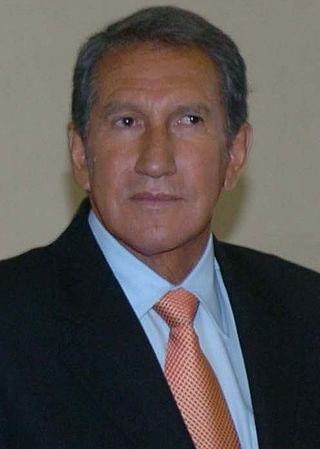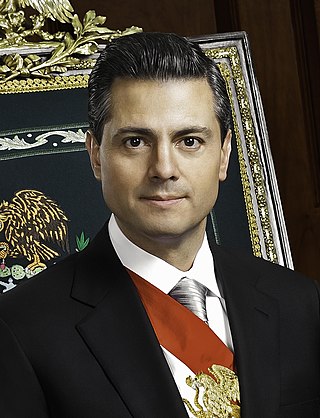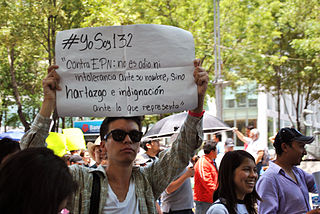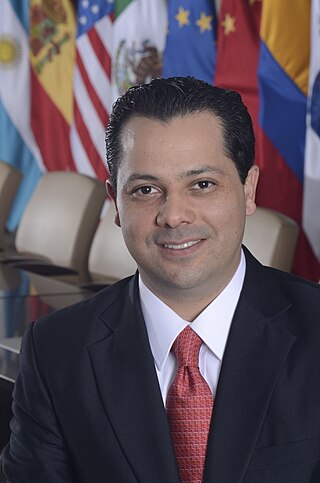
Carlos Salinas de Gortari is a Mexican economist and former politician who served as the 60th president of Mexico from 1988 to 1994. Affiliated with the Institutional Revolutionary Party (PRI), earlier in his career he worked in the Secretariat of Programming and Budget, eventually becoming Secretary. He secured the party's nomination for the 1988 general election and was elected amid widespread accusations of electoral fraud.

The Institutional Revolutionary Party is a political party in Mexico that was founded in 1929 as the National Revolutionary Party, then as the Party of the Mexican Revolution and finally as the PRI beginning in 1946. The party held uninterrupted power in the country and controlled the presidency twice: the first one was for 71 years, from 1929 to 2000, the second was for six years, from 2012 to 2018.

Grupo Televisa, S.A.B., simply known as Televisa, is a Mexican telecommunications and broadcasting company. A major Latin American mass media corporation, it often presents itself as the largest producer of Spanish-language content.

Carlos Hank González, nicknamed El Profesor, was a Mexican politician and businessman. Originally a teacher, he was an entrepreneur who built political contacts along with businesses, leading to various government and political positions at the state and national level. He was prevented from seeking the presidency due to laws requiring both parents to be Mexicans by birth, whereas his father was German.

Arturo Montiel Rojas is a Mexican politician affiliated with the Institutional Revolutionary Party (PRI). He was a governor of the State of México and a federal deputy. He contested the PRI's nomination for President of Mexico in the 2006 election before dropping out.

Enrique Peña Nieto, commonly referred to by his initials EPN, is a Mexican retired politician who served as the 64th president of Mexico from 2012 to 2018. A member of the Institutional Revolutionary Party (PRI), he previously served as Governor of the State of Mexico from 2005 to 2011, local deputy from 2003 to 2004, and Secretary of Administration from 2000 to 2002.

The governor of the State of Mexico wields executive power in the State of Mexico.
The civil unrest in San Salvador Atenco of 2006 began on Wednesday, May 3, when police prevented a group of 60 flower vendors from selling at the Texcoco local market in the State of México, about 30 km (19 mi) from Mexico City. State police used violence and arrest against resisters. The flower vendors appealed to the residents of San Salvador Atenco, a small neighboring community about 25 km (16 mi) northeast of Mexico City, famous for creating their resistance organization against the development of an airport on their land in 2002.

Atlacomulco is one of 125 municipalities in the State of Mexico located in the northwest of the State of Mexico in central Mexico, 63 kilometres (39 mi) from the state capital of Toluca. The municipal seat is the city of Atlacomulco de Fabela. The name is derived from the Nahuatl phrase "atlacomulli" which means "where there are wells." The city, with a population of 109,384 is surrounded by rural area in which 75% of the rest of the municipality lives. The municipality has a sizable percentage of indigenous language speakers, mostly Mazahua. The Mazahua name for the area is Embaró, which means "colored rock." Agriculture is still the main economic activity, but the development of a number of industrial parks, such as Atlacomulco 2000, which allowed the seat to reach city statues by 1987. Atlacomulco is also the origin of a political organization called the "Atlacomulco Group" made up of powerful political figures who deny its existence.

José Isidro Fabela Alfaro was a Mexican judge, politician, professor, writer, publisher, governor of the State of Mexico, diplomat, and delegate to the now defunct League of Nations. Fabela was born in Atlacomulco, Mexico State. He was a member of the group of intellectuals opposed to the Porfirio Díaz regime, the Ateneo de Juventud, a group that also included José Vasconcelos and Diego Rivera. He served prominently revolutionary leader Venustiano Carranza and went on to hold many important posts in the Mexican government.

Luis Videgaray Caso is a Mexican politician who served as the Secretary of Foreign Affairs from 2017 to 2018. Previously he was the Secretary of Finance and Public Credit, also in the cabinet of Enrique Peña Nieto, from 2012 to 2016. Prior to Peña Nieto's victory in the elections, Videgaray was General Coordinator of his campaign for the 2012 Mexican presidential election. On July 11, 2012, Peña Nieto announced Videgaray as the person in charge of promoting the economic reforms and the government agenda's related topics, and on September 4, he named Videgaray as co-head of the team that set policy direction for the new government that took office on December 1, 2012.

General elections were held in Mexico on Sunday, 1 July 2012. Voters went to the polls to elect a new President of the Republic to serve a six-year term, replacing Felipe Calderón, 500 members of the Chamber of Deputies and 128 members of the Mexican Senate.

Yo Soy 132, commonly stylized as #YoSoy132, was a protest movement composed of Mexican university students from both private and public universities, residents of Mexico, claiming supporters from about 50 cities around the world. It began as opposition to the Institutional Revolutionary Party (PRI) candidate Enrique Peña Nieto and the Mexican media's allegedly biased coverage of the 2012 general election. The name Yo Soy 132, Spanish for "I Am 132", originated in an expression of solidarity with the original 131 protest's initiators. The phrase drew inspiration from the Occupy movement and the Spanish 15-M movement. The protest movement was known worldwide as the "Mexican spring" after claims made by its first spokespersons, and called the "Mexican occupy movement" in the international press.

Ernesto "El Pato" de Lucas Hopkins is a Mexican politician affiliated with the Institutional Revolutionary Party (PRI). He was federal deputy during the LXI Legislature of the Mexican Congress under the principle of relative majority for the III Federal Electoral District of Sonora. On 10 December 2012 he was appointed CEO of ProMéxico, the Federal Government body that coordinates strategies to strengthen Mexico's participation in the international economy; supports the export process of companies established in Mexico and coordinates actions aimed at attracting foreign investment. On 20 April 2013 he was fired from this post, less than five months from taking over at this office, probably making him the first senior officer to be fired by President Enrique Peña Nieto.
Corruption in Mexico has permeated several segments of society – political, economic, and social – and has greatly affected the country's legitimacy, transparency, accountability, and effectiveness. Many of these dimensions have evolved as a product of Mexico's legacy of elite, oligarchic consolidation of power and authoritarian rule.
This is a list of events that happened in 2013 in Mexico. The article also lists the most important political leaders during the year at both federal and state levels.
Events in the year 2001 in Mexico.
Peñabots is the nickname for automated social media accounts allegedly used by the Mexican government of Enrique Peña Nieto and the PRI political party to keep unfavorable news from reaching the Mexican public. Peñabot accusations are related to the broader issue of fake news in the 21st century.

Alfredo del Mazo Maza is a Mexican politician formerly affiliated to the Institutional Revolutionary Party (PRI) who served as Governor of the State of Mexico from 2017 to 2023. Members of del Mazo's family have collectively governed the State of Mexico for 23 years, starting with his grandfather Alfredo del Mazo Vélez (1945-1951); then followed by his father Alfredo del Mazo González (1981-1986) and his cousin Enrique Peña Nieto (2005-2011); adding Arturo Montiel, Peña Nieto's uncle, the del Mazo family's rule extends to 29 years.

The statue of Andrés Manuel López Obrador was a limestone sculpture of the 65th president of Mexico, Andrés Manuel López Obrador. It was installed at the intersection of Isidro Fabela Avenue and Circuito José Jiménez Cantú, in Atlacomulco, a municipality of the State of Mexico. It was placed on 29 December 2021 by Roberto Téllez Monroy, the outgoing mayor. Téllez Monroy is a member of the National Regeneration Movement (MORENA) political party, which was founded by López Obrador.














